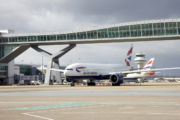-
BA have refused a delayed arrival claim as the BA flight was operated by American Airlines.
The BA ticket was a return from Charleston to London, via Dallas. The Charleston to Dallas flight being operated by AA, the Dallas to LHR operated by BA.
The Charleston to Dallas flight was delayed some 18hrs due to a technical fault meaning a missed connection at Dallas. Eventually I arrived home some 24hrs late.
BA refused compensation saying:
”I’m afraid your claim for compensation has been refused because British Airways didn’t operate AA2325 on 31 March 2023”
So are compensation claims not valid for codeshare or partner airlines, even if on a BA issued ticket?
Be grateful for any thoughts or perspectives, thanks.
Operating carrier is what matters not flight number or who you bought the ticket from.
EU/UK261 does not apply here because the flight that caused your delay was a US domestic flight operated by AA.
Denial of compo by BA is correct.
AA might toss you some AA miles but that’s about it.
Was it not decided that if the flight was part of a single booking which originated in the UK/EU, then 261 still applies? What was the exact full itinerary including airlines on each sector?
AA would still be liable but there might be some protection if it wasn’t a standalone domestic flight.Was it not decided that if the flight was part of a single booking which originated in the UK/EU, then 261 still applies? What was the exact full itinerary including airlines on each sector?
AA would still be liable but there might be some protection if it wasn’t a standalone domestic flight.It was return flight (flew out a week earlier) on a single booking. The return was bought as Charleston to London (via Dallas). The Charleston leg wasn’t bought as a separate internal AA ticket, just a connecting flight that was operated by a BA partner. The second flight (which was missed) was a BA flight from Dallas to Heathrow.
Hence I thought it was in effect a BA return flight to the UK (so compensation rules would apply).
Perhaps not.
I think compo rules may apply, I just can’t remember where it was discussed on here!
It doesn’t matter whether it was on a single booking or not, the delayed flight was operated by AA and did not start in the UK so UK261 doesn’t apply, and did not start in the EU(+associated territories) so EU261 doesn’t apply.
On the outbound part of your travel, if it was any airline from LHR to Dallas and then AA from Dallas to Charleston, then the flight from LHR being delayed would make you eligible for compensation.
If the flight from LHR being delayed caused a knock-on effect i.e. missed the booked AA domestic flight, then the eventual arrival time should be what matters even if the first flight was not late enough for compensation in its own right.
However if the first flight was on time and only the AA domestic flight was delayed then there would be no compensation due.
It doesn’t matter whether it was on a single booking or not, the delayed flight was operated by AA and did not start in the UK so UK261 doesn’t apply, and did not start in the EU(+associated territories) so EU261 doesn’t apply.
On the outbound part of your travel, if it was any airline from LHR to Dallas and then AA from Dallas to Charleston, then the flight from LHR being delayed would make you eligible for compensation.
If the flight from LHR being delayed caused a knock-on effect i.e. missed the booked AA domestic flight, then the eventual arrival time should be what matters even if the first flight was not late enough for compensation in its own right.
However if the first flight was on time and only the AA domestic flight was delayed then there would be no compensation due.
Thanks John, that’s crystal clear
@John not true about the outbound flight! If on a single ticket the flight from LHR to Charlston via Dallas, BA flight was on time and only AA domestic flight was delayed more than 3 hours then compensation would apply. This is because it’s regarded as one continuous flight. Pre-Brexit ruling Czech Airlines/Etihad has confirmed this.
However, for the inbound situation there is currently a a kind of ruling on this, but it is post-Brexit one, so does not apply to the UK. However, judges may or may not consult this.
Summary of judgment on United Airlines case (ticket bought with Lufthansa):
« Article 3(1)(a), read in conjunction with Articles 6 and 7 of Regulation (EC) No 261/2004 of the European Parliament and of the Council of 11 February 2004 establishing common rules on compensation and assistance to passengers in the event of denied boarding and of cancellation or long delay of flights, and repealing Regulation (EEC) No 295/91, must be interpreted as meaning that a passenger on a connecting flight, comprising two legs and subject to a single booking with a Community carrier, departing from an airport located in the territory of a Member State and arriving at an airport located in a third country via another airport in that third country, is entitled to compensation from the third-country air carrier which operated the entirety of that flight acting on behalf of that Community carrier, where that passenger has reached his or her final destination with a delay of more than three hours caused in the second leg of the said flight. »
Now if one were to present this in the UK court, I think it would be advisable to sue both American Airlines and BA. This was one of the points that judges were deliberating on as well. Also I’d stress that the longer flight on a single ticket was carried by the UK carrier.
@meta that LH judgment is still about a flight departing from the EU and it oddly renders the US airline liable which might be quite difficult to enforce, but here it is departing from a third country on a non UK/EU airline and it’s that which is the problem.
I don’t think it can be pinned on BA as they weren’t the operator of the flight and I think AA would fight to avoid establishing a principle.
JDB sadly I think you’re right. It’s so great to have posters here on Headforpoints like yourself and meta, who have the access to look up actual cases, and that you take the trouble.
I have often thought about this issue and what it means is it gets BA off the hook for any flight returning from the US where your return leg does not start with a BA flight.
The problem is many of us will connect on, say, Alaskan or AA to another US location after we land from Europe and in that case on the outward on one ticket we’re fully covered by EU261 to that other US city.
The problem on the return is lack of 5th freedom flights on BA so so, so often we start our return journey not on BA, but on AA/Alaskan or their subcontractors to fly to connect to the BA flight. Even if the whole ticket is BA flight numbers due to codeshare on some of these flights, we have no EU261 protection if AA /Alaskan or whichever operating airline we commenced our return with at the earlier city, does not deliver us to the BA transatlantic on time. The most we can hope for is a reroute and this is contractually provided for flights on all airlines.
I’ve been thinking perhaps it might reduce the risk if I always have an overnight after the shorter flight and before the BA flight to allow for any lateness, and never to take the last flight on any day from the other city (and maybe not the second last either).
This would largely leave mass meltdowns due to strikes or weather as risks to me successfully connecting to my BA flight. I’d look to an insurance policy to cover those rarer risks.
Based on several past experiences with US domestic connecting flights to both BA and VS I think it is wise to do as you say and pad connecting time and avoid last and second to last flights, if possible.
JDB sadly I think you’re right. It’s so great to have posters here on Headforpoints like yourself and meta, who have the access to look up actual cases, and that you take the trouble.
I have often thought about this issue and what it means is it gets BA off the hook for any flight returning from the US where your return leg does not start with a BA flight.
The problem is many of us will connect on, say, Alaskan or AA to another US location after we land from Europe and in that case on the outward on one ticket we’re fully covered by EU261 to that other US city.
The problem on the return is lack of 5th freedom flights on BA so so, so often we start our return journey not on BA, but on AA/Alaskan or their subcontractors to fly to connect to the BA flight. Even if the whole ticket is BA flight numbers due to codeshare on some of these flights, we have no EU261 protection if AA /Alaskan or whichever operating airline we commenced our return with at the earlier city, does not deliver us to the BA transatlantic on time. The most we can hope for is a reroute and this is contractually provided for flights on all airlines.
I’ve been thinking perhaps it might reduce the risk if I always have an overnight after the shorter flight and before the BA flight to allow for any lateness, and never to take the last flight on any day from the other city (and maybe not the second last either).
This would largely leave mass meltdowns due to strikes or weather as risks to me successfully connecting to my BA flight. I’d look to an insurance policy to cover those rarer risks.
Based on several past experiences with US domestic connecting flights to both BA and VS transatlantic think it is wise to do as you say and pad connecting time and avoid last and second to last flights, if possible.
- You must be logged in to reply to this topic.
Popular articles this week:


















